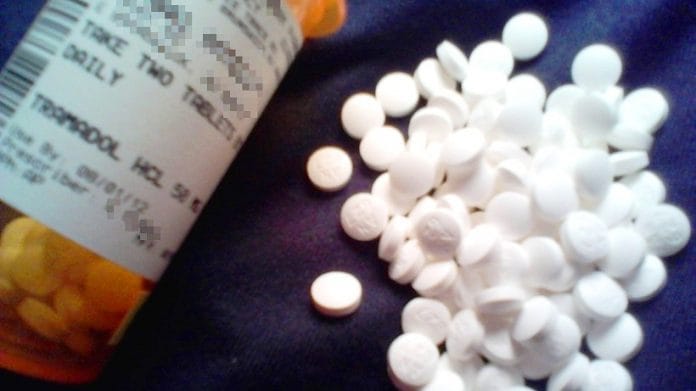New Delhi: India is a significant source of trafficked, falsified, substandard or illicitly manufactured “Tramadol” that is seized worldwide, says a report by International Narcotics Control Board.
Tramadol is an opioid-based pain-relieving drug.
“Available data suggest that in recent years, India has emerged as the centre of manufacturing of Tramadol destined for clandestine markets,” states the report for 2019 released by The United Nations Office on Drugs and Crime (UNODC).
The report blames India for being the chief illegal supplier of the drug in many countries. For instance, it states that 87 per cent of the Tramadol seized in Ghana in 2017 came from India.
The report, however, states that there has been a difference since April 2018 when India listed Tramadol among its nationally controlled substances under its Narcotic Drugs and Psychotropic Substances Act, 1985.
“Following the changes in control measures in India, experts in Ghana and Nigeria noted a significant decline in large seizures of tramadol and a corresponding increase in prices for tramadol tablets in the illicit market,” the report states.
Also read: What are APIs and how they threaten India’s status of a ‘pharmacy to the world’
Cannabis, heroin & ATS drugs all major problems in India
The UN body has also noted that apart from Tramadol, “trafficking in heroin is also a growing problem in countries on the coast of the Indian Ocean”.
“Illicit cultivation of cannabis continues to be a challenge for law enforcement agencies in South Asia, in particular in India,” its report states.
Citing analysis of data from 2010 to 2017, the report adds that India is among the countries worldwide with the greatest extent of illicit cannabis cultivation.
It has added that the seizures of amphetamine-type stimulants (ATS) peaked, at 931 kg, in India in 2018.
ATS refers to a group of drugs whose principal members include amphetamine and methamphetamine. However, a range of other substances also fall into this group, such as MDMA or ‘Ecstasy’ – an amphetamine-type derivative with hallucinogenic properties.
“The highest total annual seizures of amphetamine-type stimulants in India was in 2016, when there was a record 1.7 tons seized, before falling sharply to 95 kg in 2017,” the report states.
Also read: Twitter bots spreading bogus claims about health benefits of cannabis, says study
Increasing seizures of opium, poppy straw, and cannabis
While the report hails India’s efforts as “the only country in the subregion that has consistently reported eradication of illicit opium poppy cultivation”, it also said the problem is severe.
“Overall, there is an increasing trend in both the amount of illicit opium and poppy straw seized and the area eradicated underline the severity of the problem in the country,” it said.
India has increased its efforts to eradicate illicit opium poppy over four consecutive years beginning 2015, the report states. “In addition, the country seized a considerable quantity of poppy straw in 2018, which was 70 per cent greater than the amount of poppy straw seized in 2017,” it adds.
Despite an increase in illicit cannabis cultivation and the amount of production, “Indian drug enforcement authorities eradicated 1,980 hectares of illicit cannabis cultivation in 2018, which was substantially less than the 3,446 hectares of eradication in 2017,” the report said.
Also read: India lists 38 drug raw materials for which it wants to end dependence on China
‘India not submitting statistical report’
According to the report, while the majority of governments regularly submit their mandatory and voluntary statistical reports, the cooperation of some, including India, has not been satisfactory.
In 2019, about 86 per cent of the countries that submitted form P for 2018 did so by the deadline of 30 June 2019.
Among those nations that failed to submit form P — an annual statistics report on the manufacture, trade, and consumption of substances controlled under the Convention on Psychotropic Substances of 1971 — was India.
The other major manufacturing, importing and exporting countries that failed to file reports by the deadline were Australia, Belgium, Brazil, Canada, China, Denmark, France, Japan, Luxembourg, and Spain.
Also read: Don’t arrange hotels, sightseeing for doctors — Modi govt’s fresh warning to pharma firms






